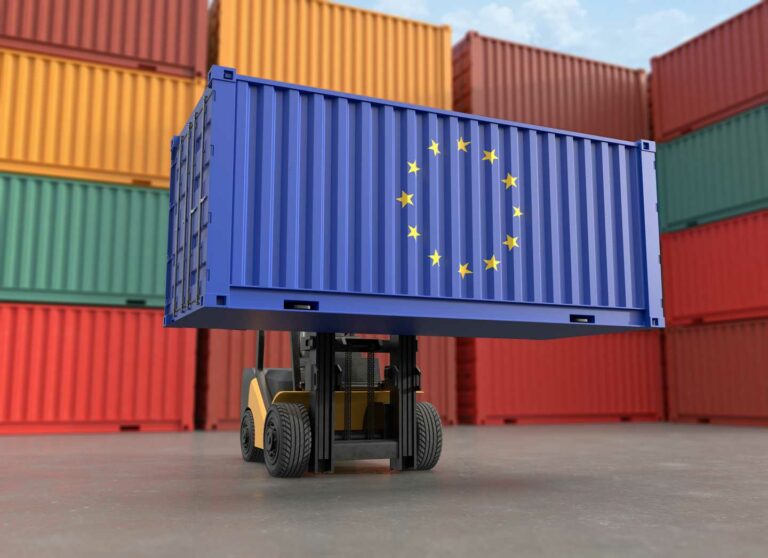The current French Intrastat has been radically changed since 1 January 2022. Find out how.
The Trade in Goods Declaration [French Intrastat] is a customs document intended for French customs and covers all intra-EU trade in goods carried out by a business during a given period.
Since 1 January 2022, new reporting obligations have been introduced in France. In order to comply with the European Business Statistics (EBS), the French administration has modified the French Intrastat reporting procedures.
As a result, the French Intrastat was repealed and replaced by two separate procedures. France adopts the reporting method established in the majority of EU Member States.
What was the French Intrastat before 1 January 2022?
The French Intrastat is a monthly obligation for businesses moving goods within the European Union, which must file declarations with the customs service. The French Intrastat records all the imports and exports of goods moving between the Member States of the European Union.
Therefore, each month, businesses must file a French Intrastat if one of the following conditions is met:
- From the first euro for exports of goods from France to another EU Member State.
- In the case of imports of goods with a value of €460,000 or more in the previous year.
- In the case of imports of goods with a value of €460,000 or more during the year. In this case, the French Intrastat is required from the month this limit is exceeded.
Until 1 January 2022, the aim of the French Intrastat was to:
- Monitor intra-EU flows of goods. In order to ensure compliance with VAT rules.
- Collect statistics on France’s foreign trade. And thus define the country’s trade balance.
As a reminder, the term “Trade in Goods Declaration” is only used in France. The rest of Europe uses the term Intrastat.
The new reporting procedures introduced on 1 January 2022
As of 1 January 2022, the Intrastat Regulation (EC) No. 638/2004 is replaced by the European Business Statistics (EBS) Regulation (EU) No. 2019/2152.
Previously, the French Intrastat merged a statistical component (collection of the main characteristics of intra-EU goods import and export flows, to feed into the external trade figure) and a fiscal component (recapitulative statement of intra-EU goods deliveries for the purpose of checking compliance with intra-EU VAT rules).
From now on, the French Intrastat will split these two procedures so that they are considered as two separate procedures:
- Monthly Statistical Survey on Intra-European Union Trade in Goods. Called “Enquête Mensuelle statistique sur les Échanges de Biens Intra-union européenne (EMEBI)” in France ;
- The VAT recapitulative statement for intra-European deliveries of goods.
Monthly Statistical Survey on Intra-European Union Trade in Goods. Called “Enquête Mensuelle statistique sur les Échanges de Biens Intra-union européenne (EMEBI)” in France

The purpose of the EMEBI is to collect confidential information for statistical purposes. This collection, which is carried out on a monthly basis with the customs authorities, concerns only a list of businesses defined in advance by the authorities. A postal letter will be sent each year to this sample to inform them of their obligations.
Therefore, only businesses in the sample are required to respond to the statistical survey.
On the other hand, the administration may adjust the panel during the year in order to adapt it to the demographics of businesses or in the event of an increase in imports and exports.
In addition, new variables are added to the existing ones. Businesses will therefore also have to report the following information:
- The country of origin;
- The European VAT identification number of the purchaser in the Member State of destination of the goods.
In addition, the list of Nature of Transaction (NoT) codes applicable to goods has been updated.
The VAT recapitulative statement for intra-European deliveries
The purpose of the VAT recapitulative statement for intra-Community deliveries remains unchanged. As a result, the resulting customs procedure remains unchanged. Businesses will have to declare the tax information for which they are liable by filling in the following data:
- The value in euros of the goods;
- The scheme employed;
- The VAT identification number of the European purchaser.
Unlike the statistical survey, which is carried out at the request of the authorities, the latter must be carried out spontaneously by the businesses.
The VAT recapitulative statement must be filed by businesses from the first euro. The collection of information related to the VAT recapitulative statement will be carried out by the French Directorate General of Customs and Indirect Rights (DGDDI) on behalf of the Directorate General of Public Finance (DGFIP).
The information collected is then transmitted to the DGFIP and to the tax services of the EU Member States concerned by the flow of goods in order to ensure control and compliance with the intra-EU VAT rules. The information collected will be used to compile statistics to improve foreign trade.
Data collection arrangements as of 1 January 2022
With the implementation of this reform, data collection is also changing. From now on, businesses will only be able to file one response per type of flow for the statistical survey and only one VAT recapitulative statement for a given reference month.
As a result,as of 1 January 2022, daily or even weekly filings are no longer accepted for both the statistical survey and the VAT recapitulative statement.
On the other hand, businesses subject to the statistical survey will be required to respond even if there are no flows. To do so, they must complete the dedicated section: “months with no statistical response”, in the “DEB WEB” online service.
Any business that has to file a declaration is liable to penalties in case of:
- Missing statement;
- Non-compliance with the deadline for filing French Intrastats;
- Error in trade declarations;
- Omission when completing a declaration.
Are you a VAT payer and do you trade goods within the European Union? You are concerned by the Intrastat/DEB declaration. Find out the 2022 Intrastat thresholds for all EU countries.
| MEMBER STATE | CURRENCY | ARRIVALS | DISPATCHES | DEADLINE |
|---|---|---|---|---|
| Austria | EUR | €750,000 | €750,000 | 10 m+1 (business day) |
| Belgium | EUR | €1,500,000 | €1,000,000 | 20 m+1 (day of the month) |
| Bulgaria | BGN | ЛВ520,000 | ЛВ780,000 | 14 m+1 (day of the month) |
| Croatia | HRK | KN2,500,000 | KN1,300,000 | 15 m+1 (day of the month) |
| Cyprus | EUR | €180,000 | €55,000 | 10 m+1 (day of the month) |
| Czeck Republic | CZK | KČ12,000,000 | KČ12,000,000 | 10 m+1 – paper (business day) 12 m+1 – digital (business day) |
| Denmark | DKK | KR13,000,000 | KR10,000,000 | Depending on the affiliated group (1 or 2)* |
| Estonia | EUR | €230,000 | €130,000 | 14 m+1 (day of the month) |
| Finland | EUR | €600,000 | €600,000 | 10 m+1 (day of the month) |
| France | EUR | On request from customs | On request from customs | 10 m+1 (business day) |
| Germany | EUR | €800,000 | €500,000 | 10 m+1 (business day) |
| Greece | EUR | €150,000 | €90,000 | Last day m+1 (business day) |
| Hungary | HUF | FT170,000,000 | FT100,000,000 | 15 m+1 (day of the month) |
| Ireland | EUR | €500,000 | €635,000 | 23 m+1 (day of the month) |
| Italy | EUR | €200,000 | €0 | 25 m+1 (day of the month) |
| Latvia | EUR | €230,000 | €120,000 | 10 m+1 (day of the month) |
| Lithuania | EUR | €280,000 | €200,000 | 10 m+1 (business day) |
| Luxembourg | EUR | €200,000 | €150,000 | 16 m+1 (business day) |
| Malta | EUR | €700 | €700 | 10 m+1 (business day) |
| Netherlands | EUR | €5,000,000 | €1,000,000 | 10 m+1 (business day) |
| Poland | PLN | ZŁ4,000,000 | ZŁ2,000,000 | 10 m+1 (day of the month) |
| Portugal | EUR | €350,000 | €250,000 | 15 m+1 (day of the month) |
| Romania | RON | L900,000 | L900,000 | 15 m+1 (day of the month) |
| Slovakia | EUR | €1,000,000 | €1,000,000 | 15 m+1 (day of the month) |
| Slovenia | EUR | €140,000 | €200,000 | 15 m+1 (day of the month) |
| Spain | EUR | €400,000 | €400,000 | 12 m+1 (day of the month) |
| Sweden | SEK | KR9,000,000 | KR4,500,000 | 10 m+1 (day of the month) - paper 13 m+1 (day of the month) - digital |
| United Kingdom (England, Wales, Scotland) | GBP | N/A** | N/A** | N/A** |
| United Kingdom (Northern Ireland) | GBP | £500,000 | £250,000 | 21 m+1 (day of the month) |
N/A: not applicable. No Intrastat obligation
Note: the information contained above is subject to change each year. This table is provided as an indication.
Taxable persons declaring goods and services to the customs administration must ensure that the filing dates imposed by each EU country are respected. The date for filing the declarations varies according to the EU Member State in which the trade declaration is made.
EMEBI filing dates for 2022
As a reminder, the filing dates for the monthly statistical surveys on intra-EU trade in goods (EMEBI) are as follows:
| Operations (on goods or services) carried out in: | Filing deadline | Filing slots |
|---|---|---|
| January 2022 | 11 February 2022 | 8:30 a.m. – 22 p.m. |
| February 2022 | 11 March 2022 | 8:30 a.m. – 22 p.m. |
| March 2022 | 12 April 2022 | 8:30 a.m. – 22 p.m. |
| April 2022 | 12 May 2022 | 8:30 a.m. – 22 p.m. |
| May 2022 | 13 June 2022 | 8:30 a.m. – 22 p.m. |
| June 2022 | 12 July 2022 | 8:30 a.m. – 22 p.m. |
| July 2022 | 11 August 2022 | 8:30 a.m. – 22 p.m. |
| August 2022 | 12 September 2022 | 8:30 a.m. – 22 p.m. |
| September 2022 | 12 October 2022 | 8:30 a.m. – 22 p.m. |
| October 2022 | 14 November 2022 | 8:30 a.m. – 22 p.m. |
| November 2022 | 12 December 2022 | 8:30 a.m. – 22 p.m. |
| December 2022 | 12 January 2023 | 8:30 a.m. – 22 p.m. |
In addition, ASD Group supports you in the application of these new measures. We take care of all your customs formalities, and we assist you with your reporting processes. Outsourcing the management of your French Intrastats to our services offers you many advantages:
- Secure your flows with our team of experts. They analyse and control the detail of all your flows, as well as your invoicing.
- Get assistance with administrative or customs controls. We assist you in the event of an inspection by the authorities and ensure your compliance.
- Outsource your declarations. Our declaration processing centre takes care of all your customs formalities.
For more information on the French Intrastat and intra-EU trade in goods, contact our experts.




